Antigua and Barbuda
Antigua and Barbuda (/ænˈtiːɡ(w)ə ... bɑːrˈb(j)uːdə/ (![]()
Antigua and Barbuda | |
|---|---|
Motto: "Each Endeavouring, All Achieving" | |
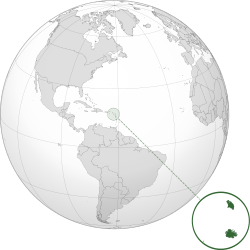 | |
| Capital and largest city | St. John's 17°7′N 61°51′W |
| Official languages | English |
| Vernacular language | Antiguan and Barbudan Creole |
| Ethnic groups (2013) | 91% African (Black) 4.4% Multiracial 1.7% European (White) 2.9% Other |
| Religion (2011[1]) | 76.5% Christian 12.2% Other 5.9% None 5.5% Unspecified |
| Demonym(s) | Antiguan Barbudan |
| Government | Unitary parliamentary constitutional monarchy |
• Monarch | Elizabeth II |
| Rodney Williams | |
| Gaston Browne | |
| Legislature | Parliament |
| Senate | |
| House of Representatives | |
| Independence | |
| 27 February 1967 | |
• from the United Kingdom | 1 November 1981 |
| Area | |
• Total | 440 km2 (170 sq mi) (182nd) |
• Water (%) | negligible |
| Population | |
• 2018 estimate | 96,286[2][3] (201st) |
• 2011 census | 81,799 |
• Density | 186/km2 (481.7/sq mi) |
| GDP (PPP) | 2019 estimate |
• Total | $2.731 billion |
• Per capita | $29,298[4] |
| GDP (nominal) | 2019 estimate |
• Total | $1.717 billion |
• Per capita | $18,416[4] |
| HDI (2018) | high · 74th |
| Currency | East Caribbean dollar (XCD) |
| Time zone | UTC-4 (AST) |
| Driving side | left |
| Calling code | +1-268 |
| ISO 3166 code | AG |
| Internet TLD | .ag |
| |
The island of Antigua was explored by Christopher Columbus in 1493 and named for the Church of Santa María La Antigua.[6] Antigua was colonized by Britain in 1632; Barbuda island was first colonised in 1678.[6] Antigua and Barbuda joined the West Indies Federation in 1958.[7] With the breakup of the federation, it became one of the West Indies Associated States in 1967.[8] Following by self-governing on its internal affairs, independence was granted from United Kingdom on 1 November 1981.
Antigua and Barbuda is a member of the Commonwealth and Elizabeth II is the country's queen and head of state.[9]
In September 2017, Hurricane Irma damaged or destroyed 95% of Barbuda's buildings and infrastructure and as a result, all the island's inhabitants were evacuated to Antigua, leaving Barbuda empty for the first time in modern history.[10]
Etymology
Antigua is Spanish for "ancient" and barbuda is Spanish for "bearded".[1] The island of Antigua was originally called Wadadli by Arawaks and is locally known by that name today; Caribs possibly called Barbuda Wa'omoni. Christopher Columbus, while sailing by in 1493 may have named it Santa Maria la Antigua, after an icon in the Spanish Seville Cathedral. The "bearded" of Barbuda is thought to refer either to the male inhabitants of the island, or the bearded fig trees present there.
History
Pre-colonial period
Antigua was first settled by archaic age hunter-gatherer Amerindians called the Ciboney.[1][11][12] Carbon dating has established the earliest settlements started around 3100 BC. They were succeeded by the ceramic age pre-Columbian Arawak-speaking Saladoid people who migrated from the lower Orinoco River. They introduced agriculture, raising, among other crops, the famous Antigua black pineapple (Ananas comosus), corn, sweet potatoes, chiles, guava, tobacco, and cotton. Later on the more bellicose Caribs also settled the island, possibly by force.
%2C_plate_V_-_BL.jpg)
European arrival and settlement
Christopher Columbus was the first European to sight the islands in 1493.[11][12] The Spanish did not colonise Antigua until after a combination of European and African diseases, malnutrition, and slavery eventually extirpated most of the native population; smallpox was probably the greatest killer.[13]
The English settled on Antigua in 1632;[12][11] Christopher Codrington settled on Barbuda in 1685.[12][11] Tobacco and then sugar was grown, worked by a large population of slaves from West Africa who soon came to vastly outnumber the European settlers.[11]
Colonial era
The English maintained control of the islands, repulsing an attempted French attack in 1666.[11] The brutal conditions endured by the slaves led to revolts in 1701 and 1729 and a planned revolt in 1736, the latter led by Prince Klaas, though it was discovered before it began and the ringleaders were executed.[14] Slavery was abolished in the British Empire in 1834, affecting the economy.[12][11] This was exacerbated by natural disasters such as the 1843 earthquake and the 1847 hurricane.[11] Mining occurred on the isle of Redonda, however this ceased in 1929 and the island has since remained uninhabited.[15]
Part of the Leeward Islands colony, Antigua and Barbuda became part of the short-lived West Indies Federation from 1958 to 1962.[12][11] Antigua and Barbuda subsequently became an associated state of the United Kingdom with full internal autonomy on 27 February 1967.[11] The 1970s were dominated by discussions as to the islands' future and the rivalry between Vere Bird of the Antigua Labour Party (ALP) (Premier from 1967 to 1971 and 1976 to 1981) and the Progressive Labour Movement (PLM) of George Walter (Premier 1971–1976). Eventually Antigua and Barbuda gained full independence on 1 November 1981; Vere Bird became Prime Minister of the new country.[11] The country opted to remain within the Commonwealth, retaining Queen Elizabeth as head of state, with the last Governor, Sir Wilfred Jacobs, as Governor-General.
Independence era
The first two decades of Antigua's independence were dominated politically by the Bird family and the ALP, with Vere Bird ruling from 1981 to 1994, followed by his son Lester Bird from 1994 to 2004.[11] Though providing a degree of political stability, and boosting tourism to the country, the Bird governments were frequently accused of corruption, cronyism and financial malfeasance.[12][11] Vere Bird Jr., the elder son, was forced to leave the cabinet in 1990 following a scandal in which he was accused of smuggling Israeli weapons to Colombian drug-traffickers.[16][17][12] Another son, Ivor Bird, was convicted of selling cocaine in 1995.[18][19]
In 1995 Hurricane Luis caused severe damage on Barbuda.[20]
The ALP's dominance of Antiguan politics ended with the 2004 Antiguan general election, which was won by Baldwin Spencer's United Progressive Party (UPP).[11] However the UPP lost the 2014 Antiguan general election, with the ALP returning to power under Gaston Browne.[21]
Most of Barbuda was devastated in early September 2017 by Hurricane Irma, which brought winds with speeds reaching 295 km/h (185 mph). The storm damaged or destroyed 95% of the island's buildings and infrastructure, leaving Barbuda "barely habitable" according to Prime Minister Gaston Browne. Nearly everyone on the island was evacuated to Antigua.[22]
Geography
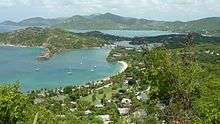
Antigua and Barbuda both are generally low-lying islands whose terrain has been influenced more by limestone formations than volcanic activity. The highest point on Antigua is Boggy Peak, the remnant of a volcanic crater rising 402 metres (1,319 feet).[1][11]
The shorelines of both islands are greatly indented with beaches, lagoons, and natural harbors. The islands are rimmed by reefs and shoals. There are few streams as rainfall is slight. Both islands lack adequate amounts of fresh groundwater.[1]
About 40 km (25 mi) south-west of Antigua lies the small, rocky island of Redonda, which is uninhabited.[11]
Cities and villages
Islands
Climate
Rainfall averages 990 mm (39 in) per year, with the amount varying widely from season to season. In general the wettest period is between September and November. The islands generally experience low humidity and recurrent droughts. Temperatures average 27 °C (80.6 °F), with a range from 23 °C (73.4 °F) to 29 °C (84.2 °F) in the winter to from 25 °C (77.0 °F) to 30 °C (86.0 °F) in the summer and autumn. The coolest period is between December and February.
Hurricanes strike on an average of once a year, including the powerful Category 5 Hurricane Irma, on 6 September 2017, which damaged 95% of the structures on Barbuda.[23] Some 1,800 people were evacuated to Antigua.[24]
An estimate published by Time indicated that over $100 million would be required to rebuild homes and infrastructure. Philmore Mullin, Director of Barbuda's National Office of Disaster Services, said that "all critical infrastructure and utilities are non-existent – food supply, medicine, shelter, electricity, water, communications, waste management". He summarised the situation as follows: "Public utilities need to be rebuilt in their entirety... It is optimistic to think anything can be rebuilt in six months ... In my 25 years in disaster management, I have never seen something like this."[25]
Ecology
Demographics
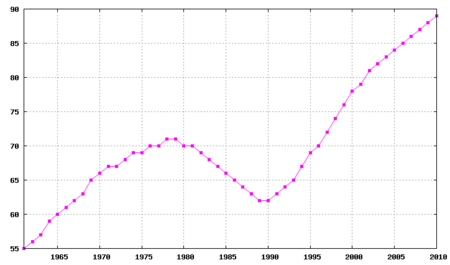
Ethnic groups
Antigua has a population of 96,286,[2][3] mostly made up of people of West African, British, and Madeiran descent. The ethnic distribution consists of 91% Black & Mulatto, 4.4% mixed race, 1.7% White, and 2.9% other (primarily East Indian and other Asian). Most Whites are of British descent. Christian Levantine Arabs, and a small number of Asians and Sephardic Jews make up the remainder of the population.
An increasingly large percentage of the population lives abroad, most notably in the United Kingdom (Antiguan Britons), United States and Canada. A minority of Antiguan residents are immigrants from other countries, particularly from Dominica, Guyana and Jamaica, and, increasingly, from the Dominican Republic, St. Vincent and the Grenadines and Nigeria. An estimated 4,500 American citizens also make their home in Antigua and Barbuda, making their numbers one of the largest American populations in the English-speaking Eastern Caribbean.[26]
Languages
English is the official language. The Barbudan accent is slightly different from the Antiguan.
In the years before Antigua and Barbuda's independence, Standard English was widely spoken in preference to Antiguan Creole. Generally, the upper and middle classes shun Antiguan Creole. The educational system dissuades the use of Antiguan Creole and instruction is done in Standard (British) English.
Many of the words used in the Antiguan dialect are derived from British as well as African languages. This can be easily seen in phrases such as: "Ent it?" meaning "Ain't it?" which is itself dialectal and means "Isn't it?". Common island proverbs can often be traced to Africa.
Spanish is spoken by around 10,000 inhabitants.[27]
Religion
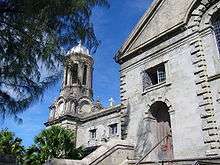
A majority (77%)[1] of Antiguans are Christians, with the Anglicans (17.6%) being the largest single denomination. Other Christian denominations present are Seventh-day Adventist Church (12.4%), Pentecostalism (12.2%), Moravian Church (8.3%), Roman Catholics (8.2%), Methodist Church (5.6%), Wesleyan Holiness Church (4.5%), Church of God (4.1%), Baptists (3.6%), Mormonism (<1.0%), as well as Jehovah's Witnesses.
Non-Christian religions practiced in the islands include the Rastafari, Islam, and Bahá'í Faith.
Governance
Political system
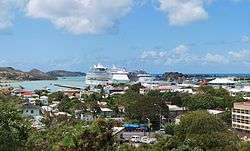
The politics of Antigua and Barbuda take place within a framework of a unitary, parliamentary, representative democratic monarchy, in which the head of State is the monarch who appoints the Governor General as vice-regal representative.[28] Elizabeth II is the present Queen of Antigua and Barbuda, having served in that position since the islands' independence from the United Kingdom in 1981. The Queen is currently represented by Governor General Sir Rodney Williams. A council of ministers is appointed by the governor general on the advice of the prime minister, currently Gaston Browne (2014–). The prime minister is the head of government.
Executive power is exercised by the government while legislative power is vested in both the government and the two Chambers of Parliament. The bicameral Parliament consists of the Senate (17 members appointed by members of the government and the opposition party, and approved by the Governor-General), and the House of Representatives (17 members elected by first past the post) to serve five-year terms.
The current Leader of Her Majesty's Loyal Opposition is the United Progressive Party Member of Parliament (MP), the Honourable Baldwin Spencer.
Elections
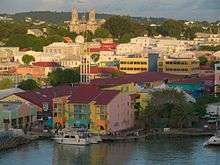
The last elections held were on 12 June 2014, during which the Antigua Labour Party won 14 seats, and the United Progressive Party 3 seats.
Since 1949, elections have been won by the populist Antigua Labour Party. However, in the Antigua and Barbuda legislative election of 2004 saw the defeat of the longest-serving elected government in the Caribbean. Prime Minister Lester Bryant Bird, who had succeeded his father Vere Cornwall Bird Sr., and Deputy Robin Yearwood had been in office since 1976.
The elder Bird was Prime Minister from 1981 to 1994 and Chief Minister of Antigua from 1960 to 1981, except for the 1971–1976 period when the Progressive Labour Movement (PLM) defeated his party. Vere Cornwall Bird, the nation's first Prime Minister, is credited with having brought Antigua and Barbuda and the Caribbean into a new era of independence.
Party elections
Gaston Browne defeated his predecessor Lester Bryant Bird at the Antigua Labour Party's biennial convention in November 2012 held to elect a political leader and other officers. The party then altered its name from the Antigua Labour Party (ALP) to the Antigua and Barbuda Labour Party (ABLP). This was done to officially include the party's presence on the sister island of Barbuda in its organisation, the only political party on the mainland to have a physical branch in Barbuda.
Judiciary
The Judicial branch is the Eastern Caribbean Supreme Court (based in Saint Lucia; one judge of the Supreme Court is a resident of the islands and presides over the High Court of Justice). Antigua is also a member of the Caribbean Court of Justice. The Judicial Committee of the Privy Council serves as its Supreme Court of Appeal.[29]
Foreign relations
Antigua and Barbuda is a member of the United Nations, the Bolivarian Alliance for the Americas, the Commonwealth of Nations, the Caribbean Community, the Organization of Eastern Caribbean States, the Organization of American States, the World Trade Organization and the Eastern Caribbean's Regional Security System.
Antigua and Barbuda is also a member of the International Criminal Court (with a Bilateral Immunity Agreement of Protection for the US military as covered under Article 98 of the Rome Statute).
In 2013, Antigua and Barbuda called for reparations for slavery at the United Nations. Prime Minister Baldwin Spencer said "We have recently seen a number of leaders apologising", and that they should now "match their words with concrete and material benefits."[30]
Military
The Royal Antigua and Barbuda Defence Force has around 260 members dispersed between the line infantry regiment, service and support unit and coast guard. There is also the Antigua and Barbuda Cadet Corps made up of 200 teenagers between the ages of 12 to 18.
In 2018, Antigua and Barbuda signed the UN treaty on the Prohibition of Nuclear Weapons.[31]
Administrative divisions
Antigua and Barbuda is divided into six parishes and two dependencies:
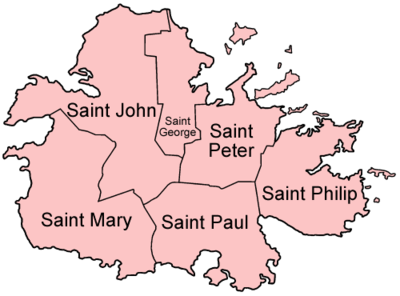
|
|
Note: Though Barbuda and Redonda are called dependencies they are integral parts of the state, making them essentially administrative divisions. Dependency is simply a title.
Human rights
Although it has not been enforced or a case brought to trial in many years, like other Caribbean islands, Same-sex sexual activity is illegal in Antigua and Barbuda and punishable by prison time. There are several current movements under way to repeal the buggery laws.[32][33]
Economy
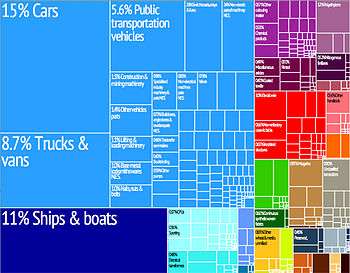
Tourism dominates the economy, accounting for more than half of the gross domestic product (GDP).[1][11] Antigua is famous for its many luxury resorts as an ultra-high end travel destination. Weakened tourist activity in the lower and middle market segments since early 2000 has slowed the economy, however, and squeezed the government into a tight fiscal corner.[1]
Investment banking and financial services also make up an important part of the economy. Major world banks with offices in Antigua include the Royal Bank of Canada (RBC) and Scotiabank. Financial-services corporations with offices in Antigua include PriceWaterhouseCoopers. The US Securities and Exchange Commission has accused the Antigua-based Stanford International Bank, owned by Texas billionaire Allen Stanford, of orchestrating a huge fraud which may have bilked investors of some $8 billion.[34]
The twin-island nation's agricultural production is focused on its domestic market and constrained by a limited water supply and a labour shortage stemming from the lure of higher wages in tourism and construction work.
Manufacturing is made up of enclave-type assembly for export, the major products being bedding, handicrafts and electronic components. Prospects for economic growth in the medium term will continue to depend on income growth in the industrialised world, especially in the United States, from which about one-third of all tourists come.
Access to biocapacity is lower than world average. In 2016, Antigua and Barbuda had 0.8 global hectares[35] of biocapacity per person within its territory, much less than the world average of 1.6 global hectares per person.[36] In 2016 Antigua and Barbuda used 4.3 global hectares of biocapacity per person - their ecological footprint of consumption. This means they use more biocapacity than Antigua and Barbuda contains. As a result, Antigua and Barbuda are running a biocapacity deficit.[35]
Following the opening of the American University of Antigua College of Medicine by investor and attorney Neil Simon in 2003, a new source of revenue was established. The university employs many local Antiguans and the approximate 1000 students consume a large amount of the goods and services.
Antigua and Barbuda also uses an economic citizenship program to spur investment into the country.[37]
Education
Antigua and Barbuda has a greater than 90% literacy rate. In 1998, Antigua and Barbuda adopted a national mandate to become the pre-eminent provider of medical services in the Caribbean. As part of this mission, Antigua and Barbuda built the most technologically advanced hospital in the Caribbean, the Mt. St. John Medical Centre. The island of Antigua currently has three foreign-owned for-profit offshore medical school. The island's medical schools cater mostly to foreign students but contribute to the local economy and health care. The three schools are:
- The American University of Antigua (AUA),[38] founded in 2004
- The University of Health Sciences Antigua (UHSA),[39] founded in 1982
- The Metropolitan University College of Medicine.
There is also the government-run Antigua State College as well as the Antigua and Barbuda Institute of Information Technology (ABIIT) and the Antigua and Barbuda Hospitality Training Institute (ABHTI). In 2019, the University of the West Indies opened its fifth campus overall (and fourth physical campus) in Five Islands.[40] The country was previously served solely by the University of the West Indies Open Campus.[41]
Island Academy International, which offers the International Baccalaureate, is the only international school in the country. There are also many other private schools but these institutions tend to follow the same local curriculum (CXCs) as government schools.
Transportation
Culture
The culture is predominantly a mixture of West African and British cultural influences.
Cricket is the national sport. Other popular sports include football, boat racing and surfing. (Antigua Sailing Week attracts locals and visitors from all over the world).
Calypso and soca music, both originating primarily out of Trinidad, are important in Antigua and Barbuda.[42]
Festivals
The national Carnival held each August commemorates the abolition of slavery in the British West Indies, although on some islands, Carnival may celebrate the coming of Lent. Its festive pageants, shows, contests and other activities are a major tourist attraction.
Cuisine
Corn and sweet potatoes play an important role in Antiguan cuisine. For example, a popular Antiguan dish, Dukuna /ˈduːkuːnɑː/ is a sweet, steamed dumpling made from grated sweet potatoes, flour and spices. One of the Antiguan staple foods, fungi /ˈfuːndʒiː/, is a cooked paste made of cornmeal and water.
Media
There are three newspapers: the Antigua Daily Observer, Antigua New Room and The Antiguan Times. The Antigua Observer is the only daily printed newspaper.[43]
The local television channel ABS TV 10 is available (it is the only station that shows exclusively local programs). There are also several local and regional radio stations, such as V2C-AM 620, ZDK-AM 1100, VYBZ-FM 92.9, ZDK-FM 97.1, Observer Radio 91.1 FM, DNECA Radio 90.1 FM, Second Advent Radio 101.5 FM, Abundant Life Radio 103.9 FM, Crusader Radio 107.3 FM, Nice FM 104.3.[43]
Literature
Antiguan author Jamaica Kincaid has published over 20 works of literature.
Sports
The Antigua and Barbuda national cricket team represented the country at the 1998 Commonwealth Games, but Antiguan cricketers otherwise play for the Leeward Islands cricket team in domestic matches and the West Indies cricket team internationally. The 2007 Cricket World Cup was hosted in the West Indies from 11 March to 28 April 2007.
Antigua hosted eight matches at the Sir Vivian Richards Stadium, which was completed on 11 February 2007 and can hold up to 20,000 people. Antigua is a Host of Stanford Twenty20 – Twenty20 Cricket, a version started by Allen Stanford in 2006 as a regional cricket game with almost all Caribbean islands taking part. Rugby and netball are popular as well.
Association football, or soccer, is also a very popular sport. Antigua has a national football team which entered World Cup qualification for the 1974 tournament and for 1986 and onwards. A professional team was formed in 2011, Antigua Barracuda FC, which played in the USL Pro, a lower professional league in the USA. The nation's team had a major achievement in 2012, getting out of its preliminary group for the 2014 World Cup, notably due to a victory over powerful Haiti. In its first game in the next CONCACAF group play on 8 June 2012 in Tampa, FL, Antigua and Barbuda, comprising 17 Barracuda players and 7 from the lower English professional leagues, scored a goal against the United States. However, the team lost 3:1 to the US.
Notables
- Steveroy Anthony, footballer
- Daniel Bailey runner (100 m, 200 m)
- Brendan Christian, runner (100 m, 200 m)
- James Grayman high jumper
- Priscilla Frederick Olympic High Jumper
- Brian Lara, cricketer, twice scored the World Test Record at the Antigua Recreation Ground.
- Claudette Peters, is an Antiguan soca and soul singer-songwriter.
- Viv Richards, cricketer, scored the fastest Test Century
- Cricketers Vivian Richards, Andy Roberts, Curtly Ambrose and Richie Richardson
- Runners Sonia Williams and Heather Samuel represented Antigua and Barbuda at the Olympic Games.
Symbols
The national bird is the frigate bird, and the national tree is the Bucida buceras (Whitewood tree).[44]
Clare Waight Keller included agave karatto to represent Antigua and Barbuda in Meghan Markle's wedding veil, which included the distinctive flora of each Commonwealth country.[45]
See also
- Geology of Antigua and Barbuda
- Outline of Antigua and Barbuda
- Index of Antigua and Barbuda-related articles
- Bibliography of Antigua and Barbuda
References
- "The World Factbook – Central America:: Antigua and Barbuda". cia.gov. Central Intelligence Agency.
- ""World Population prospects – Population division"". population.un.org. United Nations Department of Economic and Social Affairs, Population Division. Retrieved 9 November 2019.
- ""Overall total population" – World Population Prospects: The 2019 Revision" (xslx). population.un.org (custom data acquired via website). United Nations Department of Economic and Social Affairs, Population Division. Retrieved 9 November 2019.
- "5. Report for Selected Countries and Subjects", International Monetary Fund.
- "Human Development Report 2019". United Nations Development Programme. 10 December 2019. Retrieved 10 December 2019.
- Crocker, John. "Barbuda Eyes Statehood and Tourists". The Washington Post. 28 January 1968. p. E11.
- Fleck, Bryan. "Discover Unspoiled: Barbuda". Everybody's Brooklyn. 31 October 2004. p. 60.
- Sheridan, Richard B. (1974). Sugar and Slavery: An Economic History of the British West Indies, 1623–1775. Canoe Press. p. 185. ISBN 978-976-8125-13-2.
- "Antigua and Barbuda – Countries – Office of the Historian". history.state.gov.
- Panzar, Javier; Willsher, Kim (14 September 2017). "For first time in 300 years, there's not a single living person on the island of Barbuda". USA Today. Retrieved 14 September 2017.
- David Lawrence Niddrie Janet D. Momsen Richard Tolson. "Antigua and Barbuda". Encyclopædia Britannica. Retrieved 8 July 2019.CS1 maint: uses authors parameter (link)
- "Antigua and Barbuda : History". The Commonwealth. Retrieved 8 July 2019.
- Austin Alchon, Suzanne (2003). A pest in the land: new world epidemics in a global perspective. University of New Mexico Press. pp. 62–63. ISBN 0-8263-2871-7.
- "Antigua's Disputed Slave Conspiracy of 1736". Retrieved 8 July 2019.
- Kras, Sara Louise (2008). The History of Redonda. Antigua and Barbuda. Cultures of the World. 26. Marshall Cavendish. p. 18. ISBN 9780761425700.
a cableway using baskets was built to transfer the mined phosphate to a pier for shipping
- "Antiguan Quits in Weapons Scandal". Sun-Journal. 26 April 1990. Retrieved 4 July 2011.
- "Antigua-Barbuda: Government Finally Orders Probe of Arms Shipment". IPS-Inter Press Service. 25 April 1990.
- Massiah, David (7 May 1995). "Younger Brother of Prime Minister Lester Bird Is Arrested on Cocaine Charges". Associated Press Worldstream. Associated Press.
- Massiah, David (8 May 1995). "Prime Minister Lester Bird Promises No Intervention in Brother's Arrest". Associated Press Worldstream. Associated Press.
- "20th Anniversary of Hurricane Luis". Anumetservice.wordpress.com. 5 September 2015. Archived from the original on 12 September 2017. Retrieved 30 September 2017.
- Charles, Jacqueline. "Browne becomes new prime minister of Antigua, youngest ever". The Miami Herald. Retrieved 14 June 2014.
- Panzar, Javier; Willsher, Kim (9 September 2017). "Hurricane Irma leaves Caribbean Islands Devastated". Los Angeles Times. Retrieved 11 September 2017.
- Hanna, Jason; Sterling, Joe; Almasy, Steve (6 September 2017). "Hurricane Irma: Powerful storm blamed for three deaths". ABS TV Radio Antigua & Barbuda. CNN. Retrieved 6 September 2017.
- Panzar, Javier (9 September 2017). "Hurricane Irma leaves Caribbean islands devastated". Los Angeles Times.
- John, Tara /. "'There Is No Home to Go Back to.' Hurricane Irma Flattens Barbuda, Leaving Population Stranded". Time.
- "Background Note: Antigua and Barbuda". Retrieved 23 August 2007.
- Farquhar, Bernadette, "The Spanish Language in Antigua and Barbuda: Implications for Language Planning and Language Research" Archived 15 July 2013 at the Wayback Machine
- "Antigua and Barbuda 1981". Constitute. Retrieved 20 February 2015.
- "Caribbean Court of Justice". International Justice Resource Center. 5 September 2012.
- "Slavery reparations: Blood money". The Economist. 5 October 2013.
- "Chapter XXVI: Disarmament – No. 9 Treaty on the Prohibition of Nuclear Weapons". United Nations Treaty Collection. 7 July 2017.
- Avery, Daniel (4 April 2019). "71 Countries Where Homosexuality is Illegal". Newsweek.
- "State-Sponsored Homophobia". International Lesbian Gay Bisexual Trans and Intersex Association. 20 March 2019.
- Krauss, Clifford; Creswell, Julie; Savage, Charlie (21 February 2009). "Fraud Case Shakes a Billionaire's Caribbean Realm". The New York Times. Retrieved 14 April 2010.
- "Country Trends". Global Footprint Network. Retrieved 4 June 2020.
- Lin, David; Hanscom, Laurel; Murthy, Adeline; Galli, Alessandro; Evans, Mikel; Neill, Evan; Mancini, MariaSerena; Martindill, Jon; Medouar, FatimeZahra; Huang, Shiyu; Wackernagel, Mathis (2018). "Ecological Footprint Accounting for Countries: Updates and Results of the National Footprint Accounts, 2012-2018". Resources. 7 (3): 58. doi:10.3390/resources7030058.
- Citizenship by Investment Unit. "Antigua and Barbuda Citizenship by Investment Program". Antigua and Barbuda. Retrieved 2 November 2019.
- "American University of Antigua, College of Medicine". Archived from the original on 22 August 2007. Retrieved 23 August 2007.
- "University of Health Sciences Antigua". Retrieved 23 August 2007.
- "UWI Five Islands officially accepts first students". Jamaica News. Retrieved 17 December 2019.
- "The Open Campus in Antigua & Barbuda". The Open Campus. The University of the West Indies. Retrieved 16 March 2019.
- "Antigua & Barbuda – Carnival & Music". geographia.com. Retrieved 9 November 2016.
- Hillhouse, Joanne C. (3 October 2017). "The Antigua and Barbuda Media: an Abridged Record". Wadali Pen. Retrieved 1 March 2020.
- "Government of Antigua and Barbuda". ab.gov.ag. Retrieved 16 April 2020.
- "The Wedding Dress: Clare Waight Keller for Givenchy". The Royal Household, UK. 19 May 2018.
External links
| The Wikibook Wikijunior:Countries A-Z has a page on the topic of: Antigua and Barbuda |
- The Official Website of the Government of Antigua and Barbuda

- Antigua and Barbuda, United States Library of Congress
- "Antigua and Barbuda". The World Factbook. Central Intelligence Agency.
- Antigua and Barbuda from UCB Libraries GovPubs
- Antigua and Barbuda at Curlie
- Antigua and Barbuda from the BBC News
- World Bank's country data profile for Antigua and Barbuda
- ArchaeologyAntigua.org – 2010March13 source of archaeological information for Antigua and Barbuda
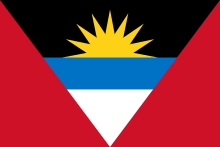

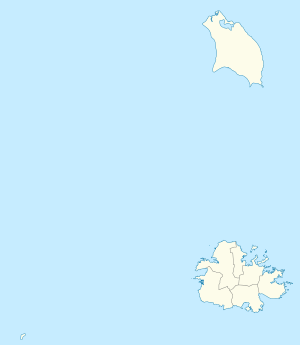
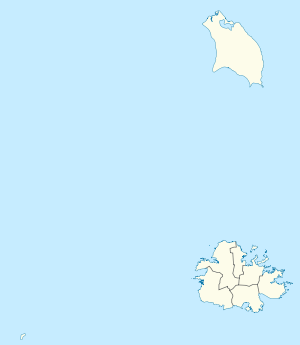
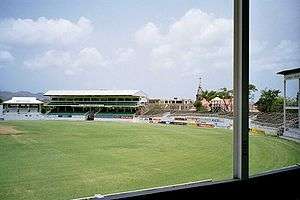
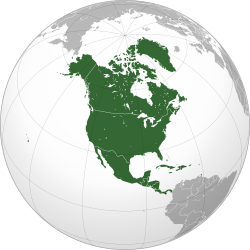

Countries.png)